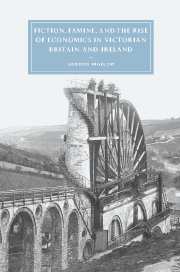Book contents
- Frontmatter
- Contents
- Acknowledgments
- Introduction
- PART I ORIGIN STORIES AND POLITICAL ECONOMY, 1740–1870
- PART II PRODUCING THE CONSUMER
- 3 Market indicators: banking and housekeeping in Bleak House
- 4 Esoteric solutions: Ireland and the colonial critique of political economy
- 5 Toward a social theory of wealth: three novels by Elizabeth Gaskell
- Conclusion
- Notes
- Bibliography
- Index
- CAMBRIDGE STUDIES IN NINETEENTH-CENTURY LITERATURE AND CULTURE
5 - Toward a social theory of wealth: three novels by Elizabeth Gaskell
Published online by Cambridge University Press: 22 September 2009
- Frontmatter
- Contents
- Acknowledgments
- Introduction
- PART I ORIGIN STORIES AND POLITICAL ECONOMY, 1740–1870
- PART II PRODUCING THE CONSUMER
- 3 Market indicators: banking and housekeeping in Bleak House
- 4 Esoteric solutions: Ireland and the colonial critique of political economy
- 5 Toward a social theory of wealth: three novels by Elizabeth Gaskell
- Conclusion
- Notes
- Bibliography
- Index
- CAMBRIDGE STUDIES IN NINETEENTH-CENTURY LITERATURE AND CULTURE
Summary
The debate over the Irish Famine makes clear the two basic positions in economic thought around 1850. The first is Trevelyan's: the faith in the market as an infallible machine of enlightenment. As I argued above in chapter 2, this is not in fact the view of capitalist markets that the early classical political economists produced, but it was the one Victorian thinkers assigned to them. The other position is the kind of romantic humanism visible in Adair and Nicholson, one that works through theories of human nature, national character, and sexual difference and leads often to a neo-feudal theory of class interdependence. This is the terrain Elizabeth Gaskell enters when she publishes her first novel in 1848.
The problem with the romantic critique of political economy, as I argued in the first section of this book, is that it was in the end very easily absorbed back into mainstream economics, turned toward a new justification of market capitalism. It protested against the kinds of ill-treatment that political economy viewed as inevitable and beneficial, but it failed to show that these abuses were the result of capitalism itself. As a result, its plea for the humane treatment of all people could be assimilated into later nineteenth-century economic theory, which was then able to arm itself against all objections launched on humanitarian grounds. It was classical political economy that claimed that the market could change and actually improve people, though this improvement might come at the cost of their lives.
- Type
- Chapter
- Information
- Publisher: Cambridge University PressPrint publication year: 2003



